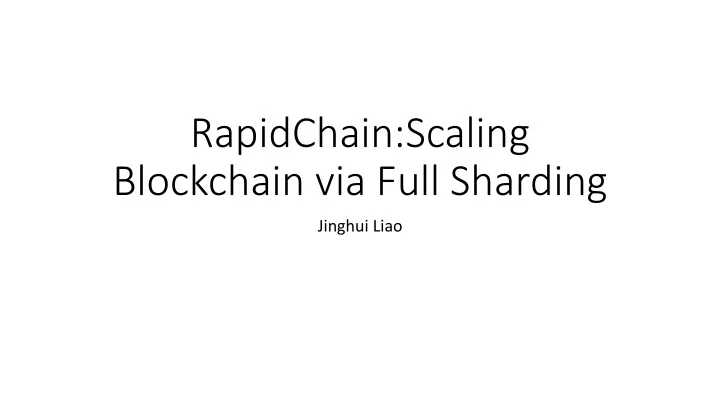

RapidChain:Scaling Blockchain via Full Sharding Jinghui Liao
Outlines • Background • Protocol • Evaluation • Conclusion
Background POW and/or POS • Low transaction throughput • High latency • Poor energy efficiency • Centralization • Committee-Based Consensus • Introduced to reduce the complexity of Byzantine agreement • Fully connected networks with only a sublinear per-node overhead • Only theoretically, not practically
Background • Algorand • Randomly select committee members by balance • Refresh committee for every consensus • Insecure randomness • Sharding-based Consensus • RSCoin • Elastico • OmniLedger • Synchronous Consensus • Information Dispersal Algorithms
Protocol • Bootstrapping • Consensus • Reconfiguration
BootsTrapping • Root group. • Running committee election protocol to select a root group. • Reference Committee • Root group generating a sequence of random bits to establish a reference committee • Establish Committees • Reference committee are responsible to create committees
Consensus • Gossip • Divides M into k chunks M1 M2 M3….Mk • Give chunks to neighbors equally • Message should be able to be reconstructed • Remarks Synchronous Consensus • Run on small number of nodes • Size of message to agree is small • Latency of each round of consensus is also small • High resiliency (1/2)
Consensus • Cross-Shard Transaction • Each tx has a unique identity • If the input is unspent • If the sum of outputs is less than the inputs • Transactions are partitioned based on tx id. • No proof attached to tx • On cross shard transaction will be split into 3
Reconfiguration • Offline PoW • Rely on Pow to protect against Sybil • Reference committee is responsible to verify PoW result • Randomness Generation • Reference Committee run a Distributed random generation protocol • Cukoo Rule • Randomly assign new node • Assign a number of members in the committee to another committee
Evaluation • Committee Size
Evaluation • Storage
Conclusion • 1/3 resilient sharding-based blockchain protocol • Highly scalable • Committee based network and storage • Scales smoothly to the size up to 4000 nodes
Thank you!
Recommend
More recommend